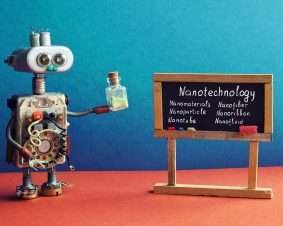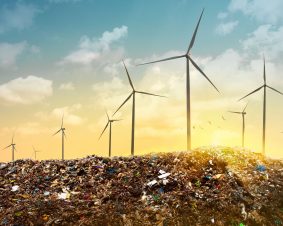 >
Spotlight August 2020: The nanoGRAVUR Grouping approach
>
Spotlight August 2020: The nanoGRAVUR Grouping approach
In August, we would like to present a paper of the German BMBF project nanoGRAVUR. nanoGRAVUR dealt from 2015-2018 with the grouping of nanostructured materials with regard to occupational safety, consumer and environmental protection and risk mitigation. The approach is now described by the project partners in this paper.
Due to the variety of synthetic nanomaterials and the numerous modifications (differences in size, shape, chemical composition and surface functionalization), the effort required to investigate effects and behaviour within the framework of regulatory requirements is enormous. Given the variability of possible effects, it is almost impossible to examine the potential risk for each nanomaterial on a case-by-case basis. Grouping or analogy now aims to allow a reliable prediction of hazards from nanomaterials of a group without additional testing by identifying certain properties or parameters.
For each of the three different areas of occupational, consumer and environmental safety, different groups may emerge, but they are based on a harmonised set of material properties with specific analytical methods, descriptors and areas. Proof of concept is provided in this publication by quantitative data on 34 case studies.
Original Publication:
Wohlleben, W, Hellack, B, Nickel, C, Herrchen, M, Hund-Rinke, K, Kettler, K, Riebeling, C, Haase, A, Funk, B, Kühnel, D, Göhler, D, Stintz, M, Schumacher, C, Wiemann, M, Keller, J, Landsiedel, R, Broßell, D, Pitzko, S, Kuhlbusch,T (2019), The nanoGRAVUR framework to group (nano)materials for their occupational, consumer, environmental risks based on a harmonized set of material properties, applied to 34 case studies. DOI 10.1039/c9nr03306h

Weitere Spotlights
Spotlight January 2022: Methods, models, mechanisms and metadata
For the new year, we are presenting no “classic” paper here, but would like to point out an editorial: Methods, Models, Mechanisms and Metadata: Introduction to the Nanotoxicology Collection at F1000 Research. This editorial introduces the F1000Research Nanotoxicology Collection, where best practices can be collected in the form of original research reports, including no-effect studies, […]
Read moreSpotlight June 2023: New catalytic process for recovering important materials from composites in a single process
Previously virtually impossible and a huge problem: fibre-reinforced resin composites (epoxides) were not recyclable, and wind turbine rotor blades, for example, add up to a waste pile of 43 million tons by 2050. Researchers have now taken an important first step in “reprocessing” these composites and catalytically dissolving them so that the carbon fibres and […]
Read moreSpotlight December 2022: Fighting tumors with micro robots
When we, the DaNa team as operators of the website nanopartikel.info, write about nanobots, i.e. nanometre-sized machines, we point out that these machines belong to science fiction, may even remain a utopia – i.e. never realisable. On the significantly larger micro-scale, however, small machines are conceivable that could help in the therapy of diseases, e.g. […]
Read moreSpotlight April 2023: Recycling rare earths – bacteria assist in the circular economy
Rare earths are important components of wind turbines, catalytic converters, fibre optic cables and plasma screens. Since the 17 metals grouped under this term are indispensable for modern technologies, demand and costs are constantly rising. The occurrence of productive mining sites is limited and the production is often costly and environmentally harmful. The advantages of […]
Read more


